This post may contain affiliate links. Please read our disclosure policy.
A quick, simple DIY (with four methods) for how to grind flaxseed for flaxseed meal, which can be used to boost the nutritional value of meals and for gluten-free & vegan baking!
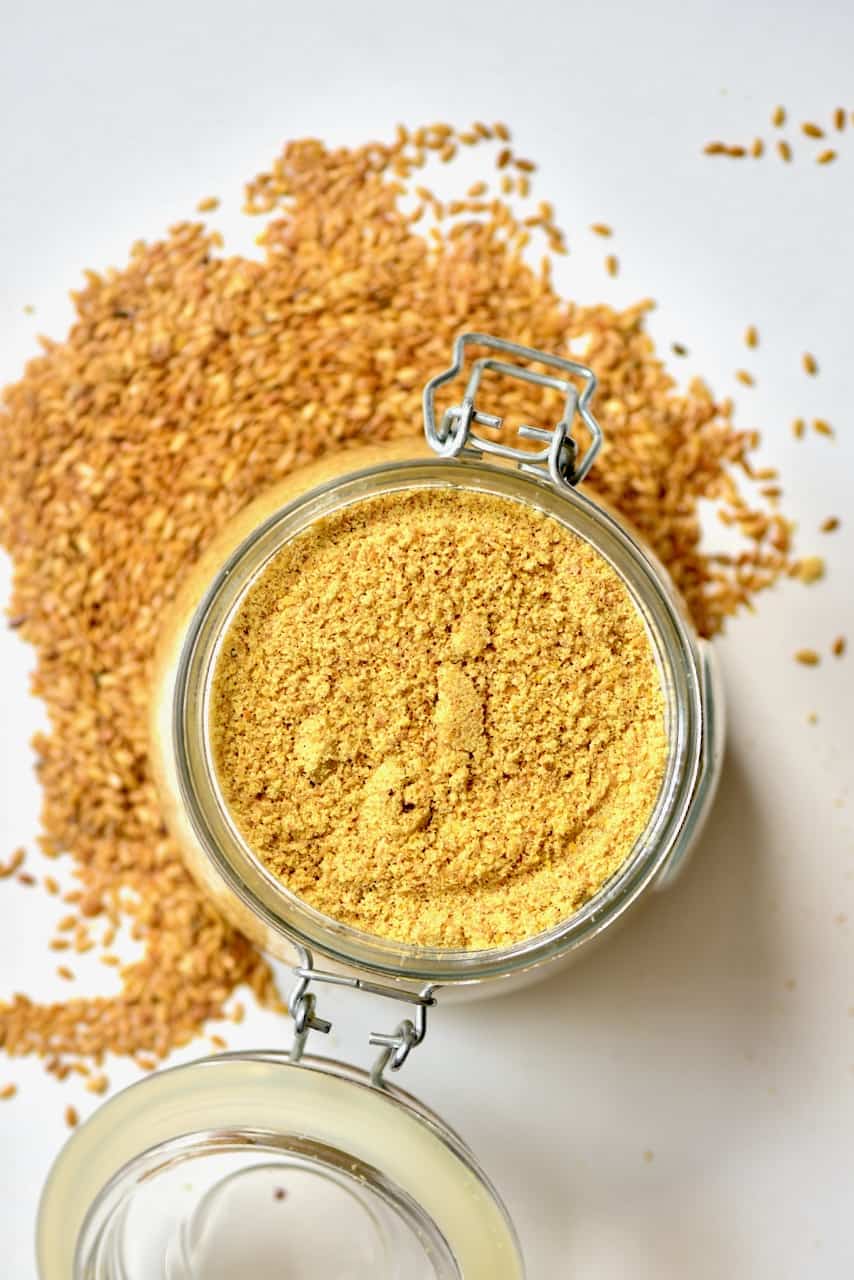
Flaxseed (also called linseed) is a superfood worthy of being added to your diet daily. However, research shows that consuming the whole seeds doesn’t allow us to unlock the nutrients of the seeds as we cannot digest them properly. Therefore, this post is going to take you through how to grind flaxseed, how to store the flaxseed meal as well as a variety of recipe and usage suggestions.
Flaxseed is available in multiple forms – as whole seeds, flaxseed meal, oil, capsules, etc. There are also two types of flaxseed; golden and brown. Their nutritional profiles are relatively similar, although the brown seeds contain higher levels of ALA and have a slightly more neutral taste. They will affect the color of the dish you’re adding them to in different ways, too.
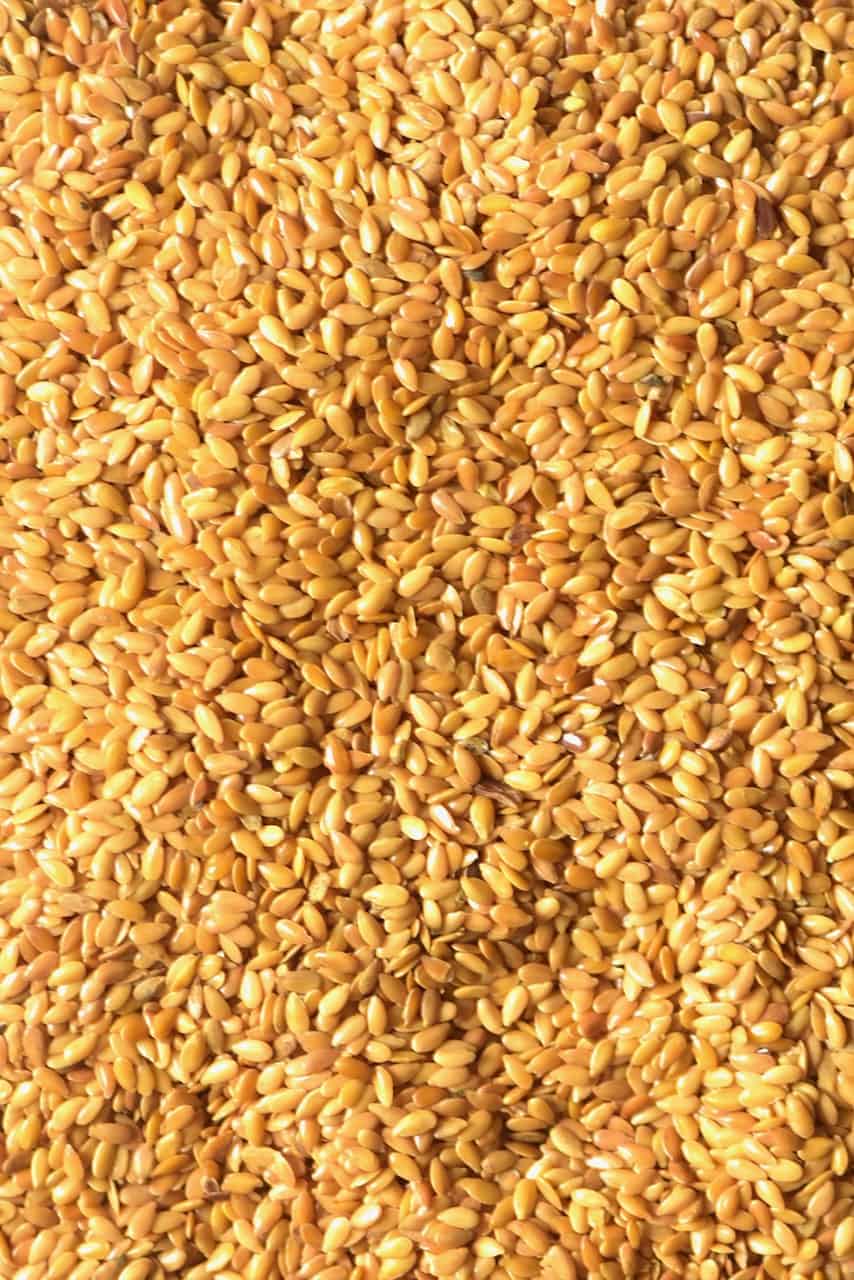
Regardless, flaxseeds have a fairly mild flavor anyway – with a slightly nutty flavor that can be incorporated into sweet and savory dishes. It’s also an excellent nutrient ‘booster’ to hide in meals for picky eaters.
The reason why this seed is such a good addition to your diet is because of its versatility. Not only can the ground flax seeds be used as a powder, but they can also be made into a vegan ‘egg’ alternative. In fact, flaxseed is Paleo, Whole30, low carb, and Keto friendly.
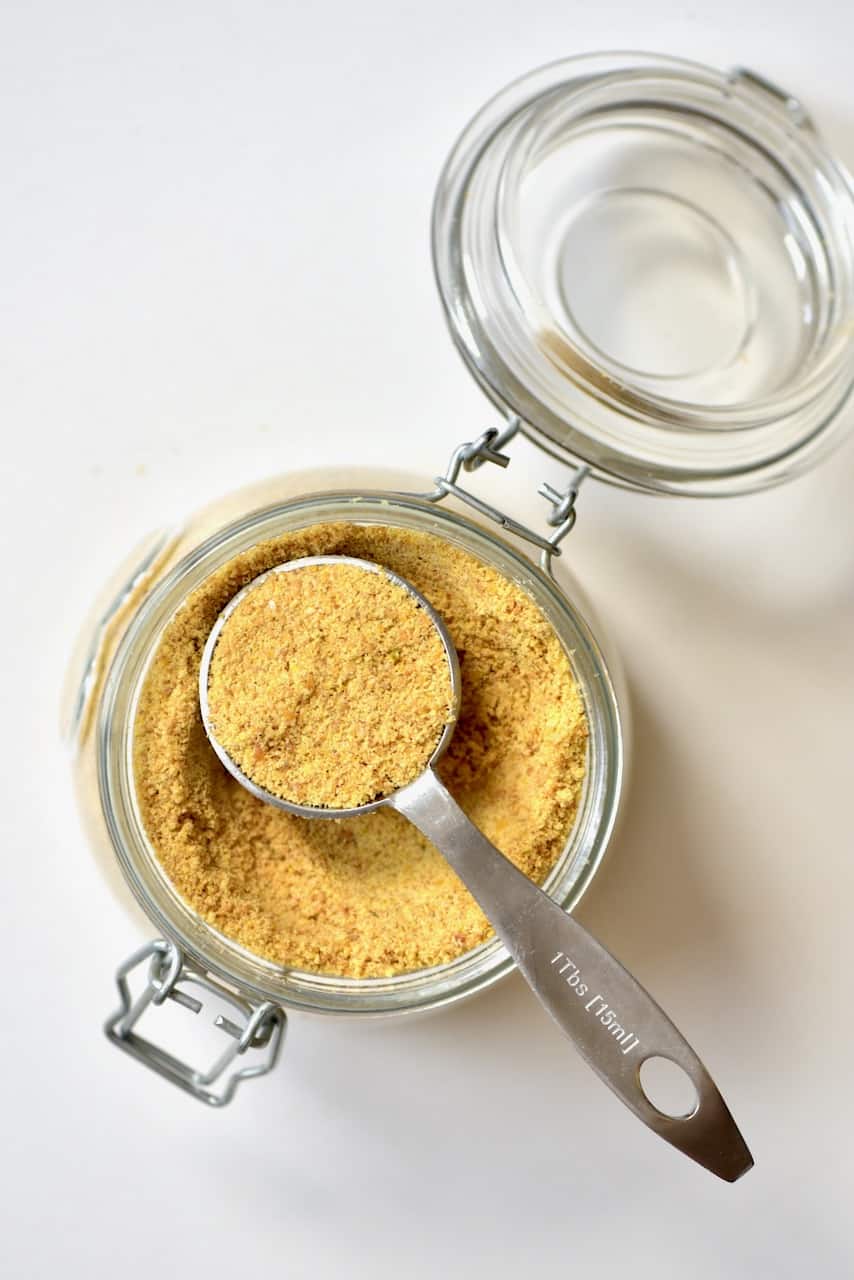
But first, you need to ground them into a flaxseed meal.
What Is Flaxseed Meal?
There is a little bit of debate about this. Just the same as how there is technically a difference between almond meal and almond flour, some argue that there is a difference between flaxseed meal and ground flaxseed/flaxseed powder.
From what I can tell, and my various supermarket trips, the two are pretty much interchangeable and often identical. However, there are a few cases when ‘flaxseed meal’ refers to the crushed seeds left over after the oil has been extracted from the seeds, which means that they don’t contain their healthy oils and fats.
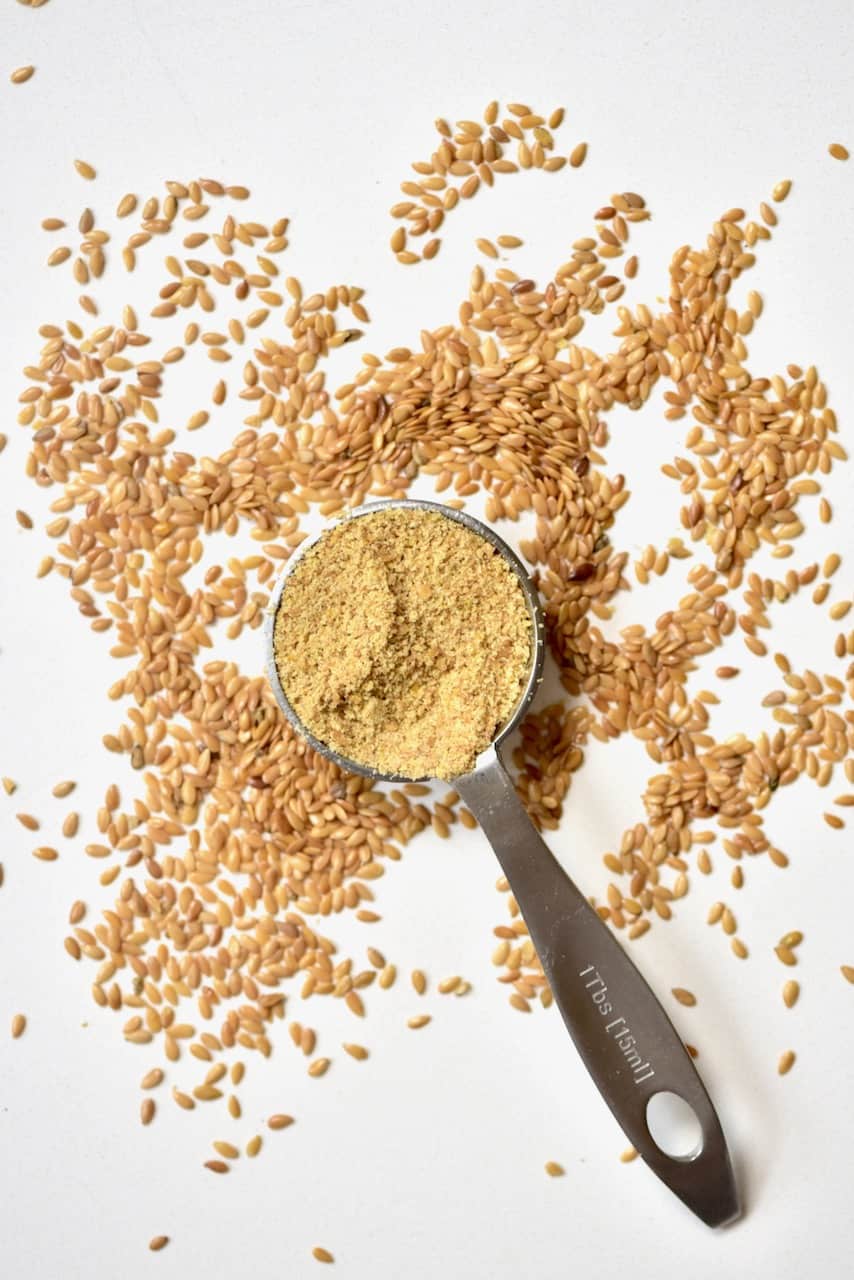
As this post is dedicated to making our own, rather than buying it from stores, I’ll be referring to flaxseed meal/ground flaxseed as the same. The flaxseed meal we will be making is a ground version of the seeds into a fine powder, which makes them easier to digest and add to a variety of recipes.
How To Grind Flaxseed
There are several methods that you can use to grind the seeds into flaxseed meal. These include a blender or food processor, using a coffee grinder or spice grinder, and even by mortar and pestle.
All methods aim to grind the seeds into a powdery form that we can digest easily. However, there is a little bit more to it than that.
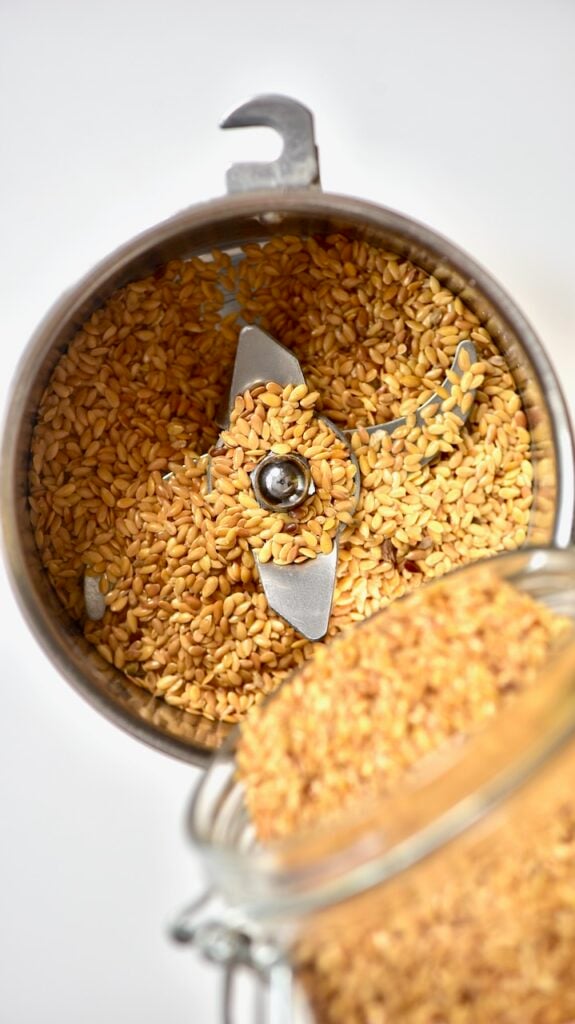
Each method has its positives and negatives, so you can decide which you’d prefer to use. For example, using a coffee grinder is probably the easiest method – however, you need to use one that isn’t also used as a coffee grinder. The coffee can, otherwise, affect the flavor of the seeds and cause them to spoil sooner.
Meanwhile, a blender may be the most convenient method for most – however, you need to grind larger batches, and thus, it can take longer.
Read the full details (and notes) for each method in the recipe card below.
Flaxseed Meal Recipes & Uses
There are a variety of ways that you can incorporate these seeds into your diet, so I’ll touch on a few of my favorite options here.
- Add into smoothies, shakes, and juices. This includes smoothie bowls, like this Vegan Chocolate Smoothie Bowl Recipe or these breakfast smoothies like Delicious Green Smoothie.
- Spoon into/over your morning cereal, oatmeal, overnight oats- like this Salted Caramel Overnight Oats, or Carrot Cake Overnight Oats, yogurt bowls, etc.
- Add to your granola and granola/breakfast bars. Including this Homemade Granola or Homemade Chewy Almond Butter Granola Bars.
- Stir into homemade salad dressings and sauces.
- You can also add some into your favorite nut butter recipe for additional nutrients. Here is a guide to nut & seed butter recipes.
- As an omega sprinkle – I love to sprinkle my protein blend on a whole variety of dishes, to up the nutritional value, and the same goes for flaxseed meal – sprinkle over bagels, salads, soups, vegetables, or even over dips like this hummus or Muhammara dip. You can also sprinkle them over ice cream if you dare.
- Spooned into large dishes, for additional nutrients. For example, within pasta bakes – like this one-pot vegetarian pasta bake, casseroles, stews, etc.
- As a breadcrumb alternative, both as a coating as well as a binding agent. For example, with veggie burgers or dishes like these Mushroom & Lentil Vegan Meatballs.
It is also an ideal ingredient for baking
And can be used for a number of baked goods in different ways. For example, to substitute oil, as a flour, as a vegan egg replacement, and more.
- Adding some to cookies, brownies, pancakes, muffins, etc., will boost nutritional value and texture. You can add 1 tbsp to any of my banana bread recipes, including this Banana Bread (Naturally Sweetened), Simple Gluten-Free Banana Bread Recipe, or this Banana Bread with Homemade Nutella.
- They are also an excellent option for including in bread recipes.
- Create a flax egg, following my quick DIY here, and use within a whole variety of baked goods recipes. You can also use these grounding methods for chia seeds, for a chia egg too.
- Use in place of oil within recipes. Use at a 3:1 ratio (3 tbsp ground seeds vs. 1 tbsp oil), and you may need additional water. However, it’s an excellent alternative option.
- They can also be used as a fat replacer once again at a 3:1 ratio i.e., butter/ margarine. However, they do cause more browning to baked goods, so cooking time may have to be adjusted.
And there are possibly tons more ways that I can’t even think of – so let me know in the comments your favorite ways to use ground flaxseed.
If you have any questions, leave a comment below Also, I love seeing your recreations so feel free to tag me on Instagram @AlphaFoodie.
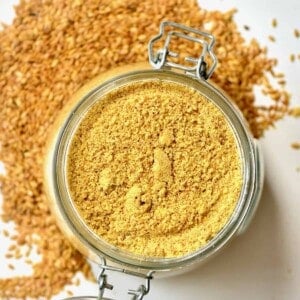
How To Grind Flaxseed (Flaxseed Meal)
Equipment
- Mortar & Pestle
Ingredients
- flax seeds golden or brown
Instructions
The Coffee Grinder/ Spice Grinder method:
- The coffee grinder* is perfect for grinding small quantities of flaxseed, for immediate use. Begin by adding the seeds to the coffee or spice grinder **

- Turn it on (or, if using manually, then begin to grind) and the seeds will be fully ground within a few seconds and slightly longer when using a manual grinder. Don't "blend" for too long or it will become hot and turn into a 'butter'.

The Blender/Food Processor Method:
- When using a blender or food processor, you'll need to grind at least 1 cup of flaxseed - otherwise it just doesn't work very well.
- Place the flaxseed into the blender or food processor and blend until the flax is ground to your desired consistency. This can take several minutes as I like to blend in 20-30 second increments then stop and shake the machine and blend again.
Mortar & Pestle Method:
- If you have none of the above tools then you could also grind the flaxseed using a mortar and pestle. This is best for smaller amounts - 1 tbsp at a time.

- Place your seeds in the mortar and use the pestle to grind the seeds into the side of the mortar, crushing them. This will take a while and you won't get a super fine consistency - however, it does work.

To Store The Ground Seeds: (see more in notes)
- Once ground, flaxseed are susceptible to going rancid fairly quickly due to the oils being sensitive to the heat and sunlight. I would usually suggest that you only make small batches anyway. However, if you do have any extra left over then store these in an airtight container in the fridge for up to 4 weeks (unfortunately, it can vary) or in the freezer for a few months.


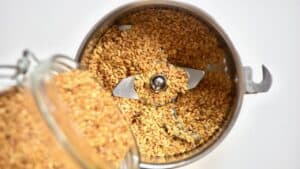
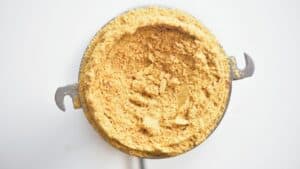
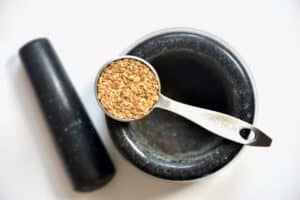
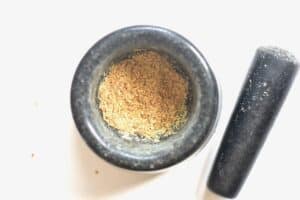
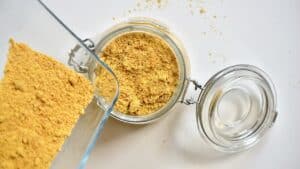









If using ground flax or chia for a vegan replacement for animal Omega-3 the ground flax/chia meal should be used within minutes because of the Omega-3 oxidation when exposed to air.
There must also be a caution against overheating when grinding with a mill (blender). A better method would be to use a burr type coffee grinder.
Thank you for sharing! Indeed, freshly ground flax or chia is best used quickly to preserve those delicate Omega-3s. I appreciate you adding this helpful tip!
Flax seeds are truly nature’s tiny powerhouses! Rich in omega-3 fatty acids, fiber, and antioxidants, they offer a myriad of health benefits. I love incorporating them into my morning smoothies for an extra nutritional boost. The versatility of flax seeds makes them a staple in my kitchen – from adding them to yogurt to using them as an egg substitute in baking. It’s amazing how something so small can have such a big impact on well-being. Great blog post on the wonders of flax seeds
They are amazing, aren’t they 🙂
Hi There,
Would a nutribullet do the job of grinding the golden flax seeds to meal?
Hi Kathie,
A Nutribullet should be able to grind golden flax seeds into a fine meal. Make sure to use a dry container and, if possible, milling blade specifically designed for grinding dry ingredients.